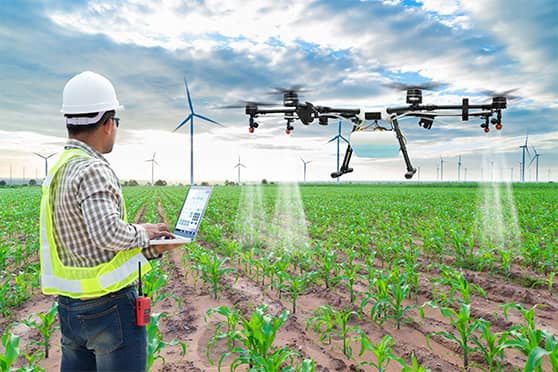Summary
Good ranking in JEE Advanced, JEE Mains or state joint entrance exams is important if you want to pursue Agricultural Engineering
IIT Kharagpur and Bidhan Chandra Krishi Vishwavidyalaya offer BTech courses
A combination of Agriculture and Technology, Agricultural Engineering is probably one of the hottest subjects in a country like India. This field of study frequently intertwines with Food Technology. If you want to bring technology to revolutionise the agriculture sector, a course in Agricultural Engineering is the ideal starting point.
Scope of Agricultural Engineering:
Agricultural engineers are in high demand as they usher in agricultural development with the aid of technical advancement. They are transforming the face of agriculture in the global market by developing new agricultural designs, methods and equipment. With the advent of various agro-tech firms and methods, Agricultural Engineering is emerging as the strongest contender for the most impactful area of study in terms of usefulness and employability.
Studying Agricultural Engineering:
- You need to clear your Class XII board exams or an equivalent exam with Physics, Chemistry, Maths as compulsory subjects. You need at least 75% marks for admission to IITs, NITs and GFTIs.
- You need to clear JEE Mains, conducted by the National Testing Agency (NTA), for admission to NITs, CFTIs and other engineering institutes.
- You need to clear JEE Advanced to get into IITs and IIT (ISM) Dhanbad. To be eligible for JEE Advanced, you need to be among the top 2,50,000 successful candidates (across all categories) in the BE/BTech paper of JEE Mains.
- You can get an Agricultural Engineering degree by clearing any of the state joint entrance exams.
- For a master’s degree in Agricultural Engineering, you need to clear the GATE (Graduate Aptitude Test in Engineering).
Some top institutes for Agricultural Engineering:
IIT Kharagpur, West Bengal
Course: BTech in Agricultural and Food Engineering.
- Duration: Four years.
- Admission: Depends on your rank in JEE Advanced.
Course: MTech in Agricultural and Food Processing Engineering (Dual Degree).
- Duration: Five years.
- Admission: Depends on your entrance rank.
Course: MTech in Food Engineering. Agricultural System and Management (Dual Degree).
- Duration: Five years.
- Admission: Depends on your entrance rank.
Course: MTech in Agricultural Engineering. Land and Water Resource Engineering (Dual Degree).
- Duration: Five years.
- Admission: Depends on your entrance rank.
Course: MTech in Agricultural Biotechnology.
- Duration: Two years.
- Admission: Depends on your entrance rank.
Click here to learn more.
Bidhan Chandra Krishi Vishwavidyalaya, West Bengal
Course: BTech in Agricultural Engineering.
- Duration: Four years.
- Admission: Depends on your WBJEE rank.
Click here to learn more.
Uttar Banga Krishi Viswavidyalaya, West Bengal
Course: BTech in Agricultural Engineering.
- Duration: Four years.
- Admission: Depends on your WBJEE rank.
Click here to learn more.
Agricultural Engineering College and Research Institute, Kerala
Course: BTech in Agricultural Engineering.
- Duration: Four years.
- Admission: Depends on your JEE Mains rank.
Click here to learn more.
NIMS University, Rajasthan
Course: BTech in Food and Agricultural Engineering.
- Duration: Four years.
- Admission: Depends on your entrance rank conducted by the university.
Click here to learn more.
Deenbandhu Chhotu Ram University of Science and Technology (DCRUST), Haryana
Course: BTech in Agricultural Engineering.
- Duration: Four years.
- Admission: Depends on your JEE Main rank.
Click here to learn more.
Shri Guru Ram Rai University, Uttarakhand
Course: BTech in Agricultural Engineering.
- Duration: Four years.
- Admission: Depends on your JEE Main rank.
Click here to learn more.
Job roles with a degree in Agricultural Engineering:
-
Agriculture officer: Their responsibilities include ensuring that agricultural activities follow state and federal regulations. Both central and state governments have these posts.
-
Site engineer: They maintain the safety regulations for any ongoing site work and ensure that all technical and material requirements for site development are met.
-
Agricultural food scientist: They undertake study and experiment with crops and food production. They work for corporate agricultural organisations and government agencies.
-
Production manager: They ensure that agricultural goods are delivered on schedule at a reasonable cost. They also ensure the quality of such goods.
-
Soil engineer: They work to generate high-quality soil and maintain its profile, among other things.
-
Sales representative: The sales representative is responsible for ensuring that a specific amount of agricultural products generated by a specific industry is sold in the market.
-
Agricultural officer: They monitor and verify that agricultural activities are adhering to state and federal regulations.
-
Natural resource engineer: They ensure that natural resources like land, water, and soil are used sustainably.
-
Crop specialist: They study and work with crops. Their primary goal is to figure out how to grow more high-quality crops.
Last updated on 10 May 2022

